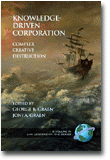
Knowledge-Driven Corporation
Complex Creative Destruction
Edited by:
George B. Graen, University of Illinois, Champaign-Urbana (retired)
Joan A. Graen, Graen and Associates
A volume in the series: LMX Leadership: The Series. Editor(s): George B. Graen, University of Illinois, Champaign-Urbana (retired).
Published 2008
This book is about preparing our thinking, feeling, and acting for the rapidly expanding “knowledge era.” We discuss the following queries in the chapters. We begin with a discussion of what an appropriate knowledge-driven corporation (KDC) is. Next, we explore a number of design issues about this transformed charter company and present two examples of new knowledgedriven corporations that are described in strategic and tactical terms. At this point, the questions of management and leadership selections and development for the KDC are discussed in the next two chapters. These are followed by two chapters discussing the “political side” of human KDC in terms of “fit” or “no fit.” Following this discussion of our frail interpersonal habits, project teams’ research shows how an orderly process of team leadership development unfolds
over the project life cycle. Finally, the last chapter discusses where we are concerning emergent response leadership in building real knowledge-driven corporations. This book is dedicated to survival of the best of the best of our corporations in the knowledge era through complex creative destruction.
CONTENTS
Foreword. Preface. List of Contributors. What Is a Knowledge-Driven Corporation? George B. Graen. Making the
Transformation to the Knowledge-Driven Corporation, George B. Graen. Far-Flung Teams and the Knowledge-Driven Corporation,
Arvind Malhotra and Ann Majchrzak. Gome and Suning: The Making of Retail Business Empires in China, Guo Shaojun, Wang Yaoqiu,
and Matthew Waller. Complex Adaptive Leadership: Defining What Constitutes Effective Leadership for Complex Organizational
Contexts, Sean T. Hannah, John T. Eggers, and Peter L. Jennings. The Heart of the Servant Leader: Leader’s Motivation-to-Serve and
Its Impact on LMX and Subordinates’ Extra-Role Behaviors, Kok-Yee Ng, Christine S-K. Koh, and Hock-Chye Goh. The Role of Politics
and Political Behavior in the Development and Performance of LMX Relationships: A Multilevel Approach, Darren C. Treadway,
Jacob W. Breland, Laura A. Williams, Lei Wang, and Jun Yang. Birds of a Feather Flock Together: The Relationship between Leader–
Follower Self-Regulation Congruency, LMX, and Outcomes, Ronit Kark and Dina Van-Dijk. Examining the Relative Importance of
Leader–Member Exchange on Group Performance Over Time, Loren J. Naidoo, Charles A.
Scherbaum, and Harold W. Goldstein. Why Knowledge-Driven Corporations Should Invest in
Developing Emergent Response Leadership for Both Face-to-Face and Far-Flung Teams,
George B. Graen. About the Contributors.
-
Paperback978-1-59311-941-6
Web price: $45.04 (Reg. 52.99)
-
Hardcover978-1-59311-942-3
Web price: $80.74 (Reg. 94.99)
- eBook9781607528982

- BUS083000 - BUSINESS & ECONOMICS: Information Management
- BUS041000 - BUSINESS & ECONOMICS: Management
- BUS071000 - BUSINESS & ECONOMICS: Leadership
-
 Global Organizing Designs
Global Organizing Designs
-
 Management of Team Leadership in Extreme Context
Defending Our Homeland, Protecting Our First Responders
Management of Team Leadership in Extreme Context
Defending Our Homeland, Protecting Our First Responders
-
 Millennial Spring
Designing the Future of Organizations
Millennial Spring
Designing the Future of Organizations
-
 New Frontiers of Leadership
New Frontiers of Leadership
-
 New Multinational Network Sharing
New Multinational Network Sharing
-
 Predator's Game-Changing Designs
Research-Based Tools
Predator's Game-Changing Designs
Research-Based Tools
-
 Sharing Network Leadership
Sharing Network Leadership

